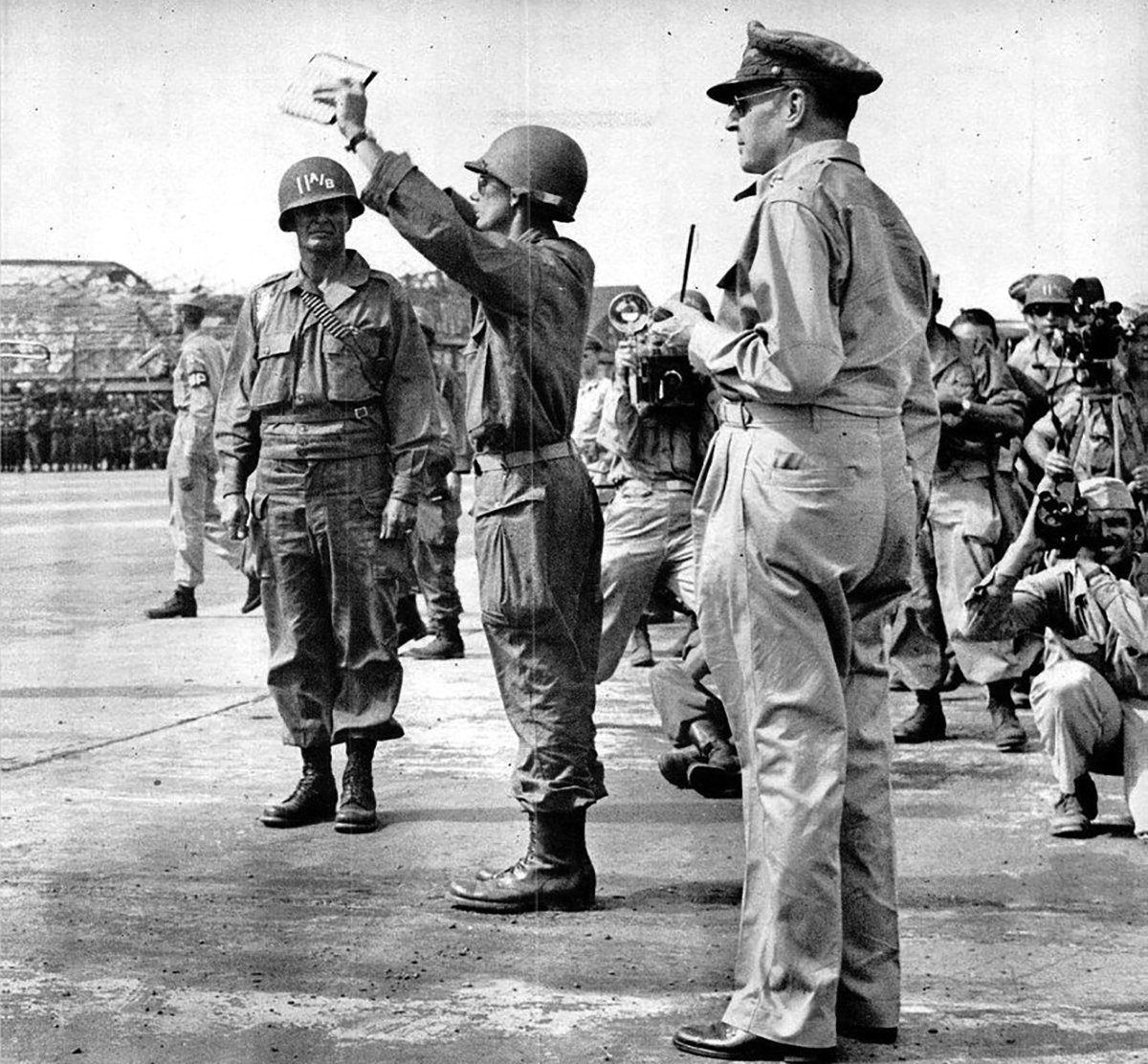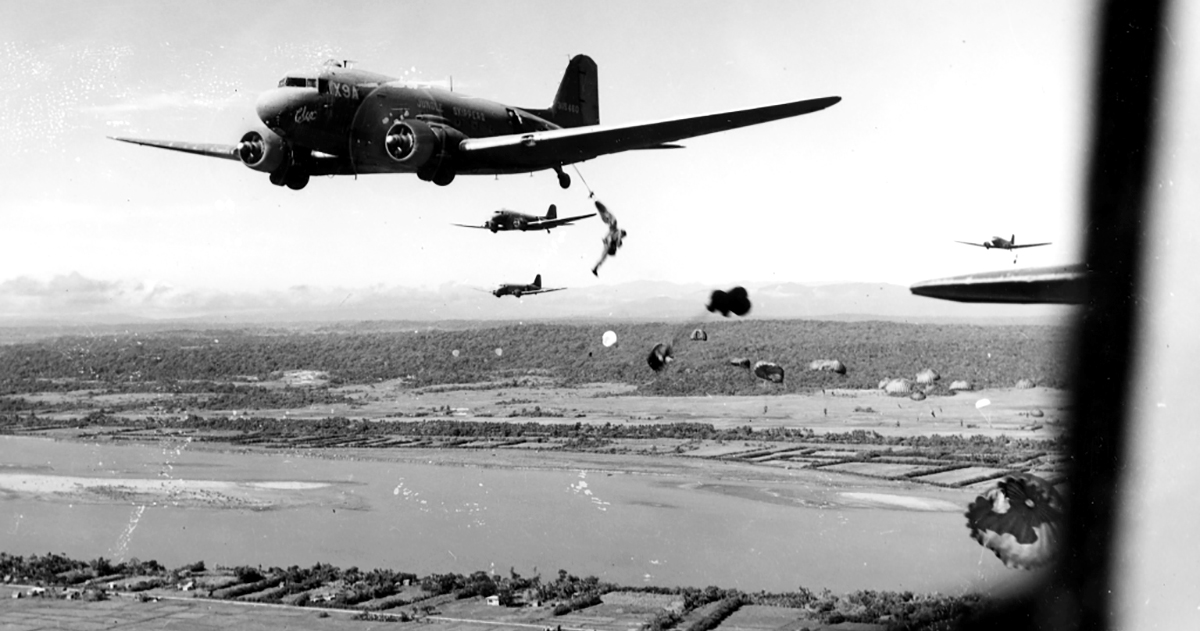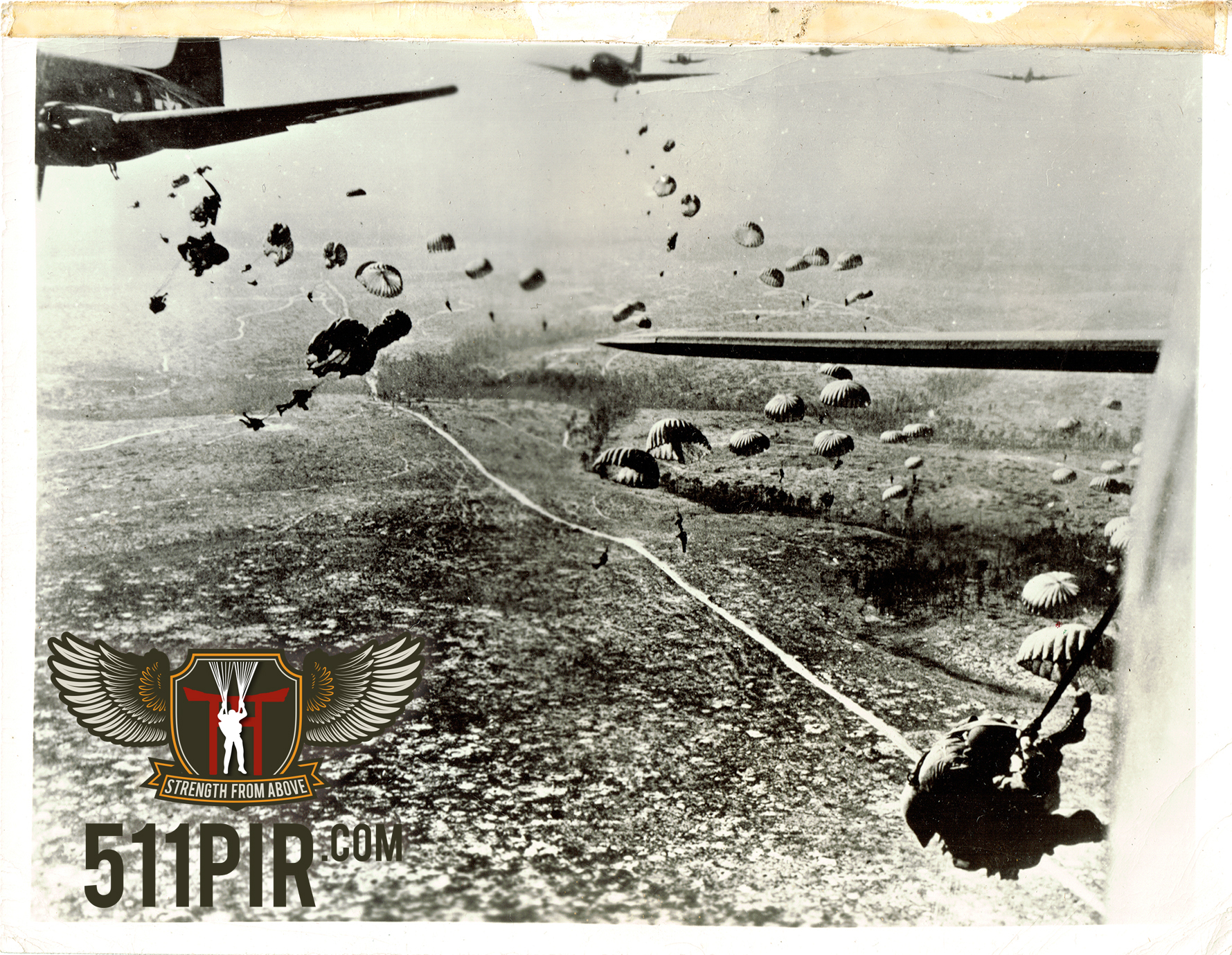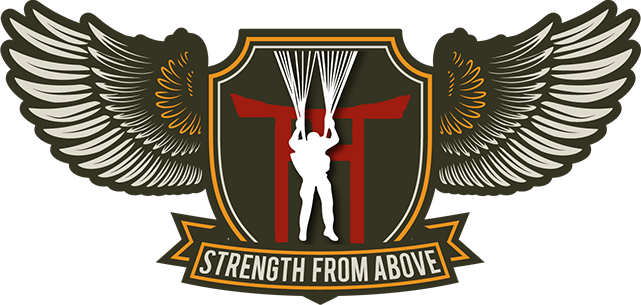 While the mighty 11th Airborne Division served with distinction in World War II and Korea, the division's "theme song" did not come along until the fall of 1950 after the Angels had returned to the United States following Occupation Duty in Japan. A contest was held to encourage the composition of songs and marches that would become anthems of the 11th Airborne Division and perhaps none of the final four entries is as well-known as the marching-ballad (which I'm sure was sung in bars and pubs by Angels since 1950) titled "Down From Heaven", an original song submitted by Colonel Byron Leslie Paige (SSN 376405509, USMA 1932) of Shelby, Michigan. The music that accompanied COL Paige's lyrics was arranged by Sergeant George Whissen.
While the mighty 11th Airborne Division served with distinction in World War II and Korea, the division's "theme song" did not come along until the fall of 1950 after the Angels had returned to the United States following Occupation Duty in Japan. A contest was held to encourage the composition of songs and marches that would become anthems of the 11th Airborne Division and perhaps none of the final four entries is as well-known as the marching-ballad (which I'm sure was sung in bars and pubs by Angels since 1950) titled "Down From Heaven", an original song submitted by Colonel Byron Leslie Paige (SSN 376405509, USMA 1932) of Shelby, Michigan. The music that accompanied COL Paige's lyrics was arranged by Sergeant George Whissen.
Apart from the actual words of the song, the musical component of COL Paige's piece has been lost to history until now. For several decades the division's "old troopers" and a handful of interested historians have had access to the song's words, but I recently came across one of the last (as far as I can tell) recordings of this rousing song on an old vinyl LP recorded by the 11th Airborne Division Band with the 188th Airborne Infantry Regiment Choral Group under W.O. Carroll H. Grummish. Recorded at Reavis Recording Company (2014 Beech Avenue, Nashville, Tennessee), this old record from 1950 was a bit scratchy and dusty, and after several hours of labor I have done my best to digitize and clean up the audio. If you would like a copy of this song, please email me using this website's contact form. -Jeremy Holm
You can listen to the cleaned up copyrighted audio of this song by clicking below. The words of the song are below the player and then a brief history of the 11th Airborne Division Band follows. NOTE: there is also a bonus song titled "Luzon March" that was recorded at the same time in 1950 by the 11th Airborne Division Band and was composed by band-member and future MTNA-fellows Paul Bordeleau of Bedford, New Hampshire.
"Down From Heaven"
BONUS TRACK: "Luzon March"
Down From Heaven
By Colonel Byron L. Paige and arranged by Sergeant George Whissen
 Stand in the door!
Stand in the door!
Stand in the door!
Down from heaven comes Eleven
And there's hell to pay below
Shout Geronimo! – Geronimo!
Hit the silk and check your canopy
And take a look around
The air is full of troopers
Set for battle on the ground
Till we join the stick of Angels
Killed on Leyte and Luzon
Shout Geronimo! – Geronimo!
It's a gory road to glory
But we're ready – here we go
Shout Geronimo! – Geronimo!
 Stand in the door!
Stand in the door!
Stand in the door!
Down from heaven comes Eleven
And there's hell to pay below
Shout Geronimo! – Geronimo!
Hit the silk and check your canopy
And take a look around
The air is full of troopers
Set for battle on the ground
Till we join the stick of Angels
Killed on Leyte and Luzon
Shout Geronimo! – Geronimo!
It's a gory road to glory
But we're ready – here we go
Shout Geronimo! – Geronimo!
About the 11th Airborne Division Band: While the 11th Airborne Division was officially formed at Camp Mackall, NC on February 25, 1943, the division's band has a history that pre-dates that historic occasion.
Byron Leslie Paige was born on April 9, 1909 in Deckerville, Michigan to Mr. and Mrs. Earl Paige, Byron L. Paige retired from the United States Army as a full-bird Colonel on November 1, 1960. He was a member of the TROA-West Point Society, a War College Alumni and a graduate of West Point Academy (class of 1932) where he ranked in the top 50 of his class. He was married to 1LT Helen T. "Suzie" Pain of Fallbrook, California at 5 o'clock on December 27, 1933 in her parents' quarters at Randolph Field, Texas. Together they had two sons: Christopher and Timothy, and three daughters: Maretta, Melinda and Patricia as well as 7 grandchildren and 1 great-grandchild.
During his teenage years, Bryon was a member of the gymnasium, football and track squads. He received a letter and a monogram in gymnastics and a monogram in track and was a qualified rifle shot. While at West Point (July 2, 1928-June 9, 1932) he was a member of the cadet orchestra, wrote the words and music of a song for Hundredth Night, and tutored other cadets who needed help with various subjects. He also wrote several articles for the Howitzer and the Pointer.
Prior to graduating from West Point as a twenty-three-year-old Second Lieutenant of the Calvary, who was detailed to the air corps, Byron spent seven months at the Air Corps Technical School at Chanute Field, Illinois and six months at West Point Preparatory School at Fort Sheridan, Illinois, before receiving his West Point appointment from the regular army.
Of note, in September 25, 1939, 2LT Byron Paige began teaching a Public Speaking Class at the Newburgh, NY YMCA. Paige was a graduate of the Dale Carnegie course in public speaking and was serving as an instructor in English and public speaking critic at the United States Military Academy.
During his military career, Byron served in the Coast Artillery Corps, including time in Hawaii followed by being stationed at West Point (1939). In 1940 he was promoted to Captain at Camp Hulen, Texas then Lieutenant Colonel on October 14, 1942 when he was transferred to Fort Leavenworth, Kansas. In 1943 he served as the Assistant Director, General Staff Course, Command and General Staff School at Leavenworth then was Director, General Staff Course also at Leavenworth. He was promoted to full-colonel on October 27, 1944. He transferred to the Field Artillery on May 1, 1947 then was assigned G-3, GHQ of Far East Command in Japan.
On December 15, 1948, COL Paige was selected as the winner of the Special Services Army Song Contest, an achievement which earned him a $50 Savings Bond courtesy of Eighth Army Special Services. The contest was open to all US military personnel and was an attempt to find a song that was "worthy of becomming an all-Army song as differentiated from those of the various branches and services of the US Army" and LTC Paige's song, "Here's to the Army" was recorded to a V-disc and added to the Army-Navy Hit Kit. In 1949-1950 his song "Down From Heaven" was selected as a finalist by the 11th Airborne Division as an official marching song for the Angels.
In 1954 COL Paige was assigned Chief of Staff at Fort Carson, Montana and for the 8th Infantry Division. He was then sent to Paris, France (I am still researching his post there). Byron then retired on November 1, 1960. He then was the assistant director of Los Angeles' famous Marina del Rey harbor. He died on January 20, 2000 in Fallbrook, California, at the age of 90, and was buried in Riverside, California.
He was awarded the Legion of Merit with Oakleaf Cluster, the Bronze Star Medal, the Air Medal and the Commendation Ribbon with 2x Oakleaf Clusters.
I do know that COL Paige received credit for service during WWII and the Korean War in the Philippines and Korea, but I am struggling to find his official records for those units. If you know which units Byron served in overseas during these two wars, please contact me through this website.
When Angels Fall: From Toccoa to Tokyo, the 511th Parachute Infantry Regiment in World War II
Jeremy Holm: The Liberation of Los Banos
To learn more about the 11th Airborne Division in World War II, please consider purchasing a copy of our books on the Angels:




